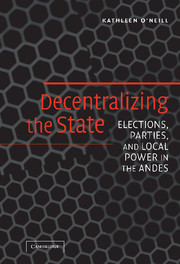2 - A Political Theory of Decentralization
Published online by Cambridge University Press: 02 December 2009
Summary
Introduction
As decentralization became more widespread throughout the world in the 1980s and 1990s, it ignited a great deal of scholarship. Economists and professionals within the development research community dominated the discussion of decentralization, focusing on outcomes and the implementation of reforms. Indeed, both the Inter-American Development Bank and the World Bank featured detailed discussions of fiscal and political decentralization in their annual reports (Inter-American Development Bank 1994, 1997; World Bank 1997), and both institutions, along with the U.S. Agency for International Development (USAID), have funneled significant funds into decentralizing reforms in the region. These reports ask questions such as: Does decentralization improve service delivery? Does it increase responsiveness to local needs? Does it improve schools? Health care? Poverty? Corruption? While these are all critical questions, the equally important and prior questions – why and when do countries decentralize – received much less attention.
The focus on outcomes reflects the priorities of international institutions and the theoretical framework from which economists begin their inquiries. Economists often begin by assuming a welfare-maximizing government, leaving them few tools for exploring the political motives behind decentralizing reforms. Because it peers deeply into the incentives of policy makers, political science is uniquely equipped to explore the question of decentralization's preconditions. As I argued in the last chapter, however, the existing political scholarship on the related topics of federalism and delegation does not yield a compelling theory to explain the actual range of decentralizing experiences.
- Type
- Chapter
- Information
- Decentralizing the StateElections, Parties, and Local Power in the Andes, pp. 14 - 48Publisher: Cambridge University PressPrint publication year: 2005



